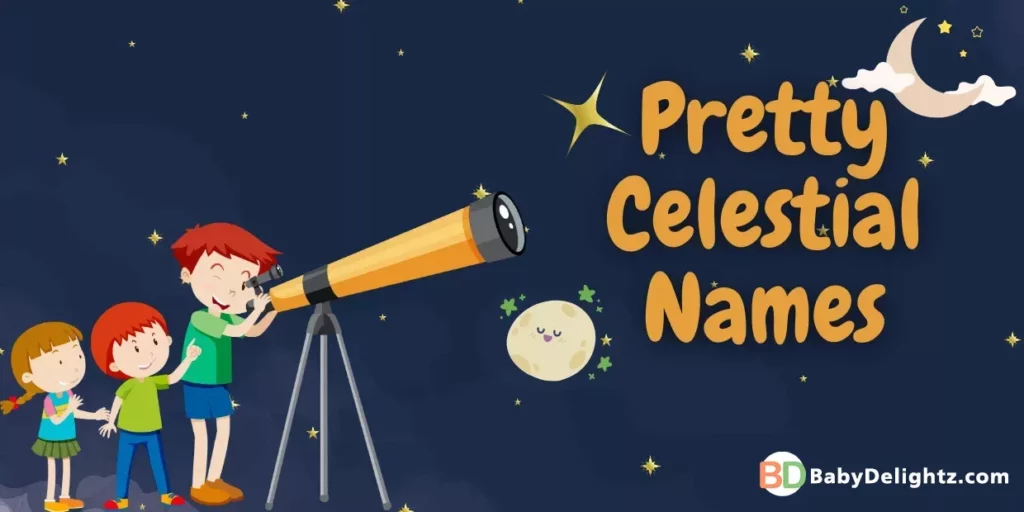Discover the allure and mystique behind Pretty Celestial Names, diving deep into the stories and origins of some of the most stunning cosmic denominations.
The universe is a vast, enchanting, and infinite expanse. The stars, planets, and galaxies have long captured the imagination of humanity. Names serve as a reflection of our identity and can be as boundless as the cosmos itself. For many, pretty celestial names are the perfect fusion of mystery and beauty. Names can be our personal galaxies, each shimmering with its own tale, history, and significance. For those parents seeking to christen their little ones with the ethereal charm of the heavens, the cosmic realm offers an expansive and mesmerizing selection. From constellations to celestial bodies and mythological deities, these names are imbued with wonder and aspirations.
So, if you’re aiming for your offspring’s name to evoke the infinite beauty and possibilities of the universe, let’s embark on this celestial journey of naming and exploration.
Pretty Celestial Names: A Starry Guide
Have you ever looked up at the night sky and felt a profound connection? 🌟 There’s something magical about those twinkling stars, isn’t there? Now, imagine naming your child after one of these celestial wonders!
The Magic Behind celestial names
The universe, with its vast expanse and mysterious allure, has always inspired humanity. From ancient stories to modern space exploration, the cosmos and its elements play a pivotal role in our culture, beliefs, and even our names.
The Beauty of Stars and Their Names
Origins of Starry Nomenclature
The tradition of naming children after celestial bodies is as old as civilization itself. Ancient cultures revered the stars, attributing divine qualities to them and naming their offspring in their honour. To have a name that resonates with a star or a constellation meant the child was blessed or destined for greatness.
The Connection Between Stars and Human Identity
Have you at any point considered the reason why we feel so associated with the universe? Similar to stars, every one of us is exceptional and sparkles in our manner. Naming a child after a celestial body signifies hope, dreams, and the boundless potential within us.
Popular Celestial Names for Girls
Lyra: The Heavenly Harp
Originating from the Latin word for harp, Lyra is also a constellation in the northern sky. For a daughter, this name embodies elegance, grace, and melodic beauty.
Nova: A Burst of Starry Light
The word Nova means “new” in Latin. In astronomy, a nova is a star showing a sudden large increase in brightness. For a girl, the name symbolizes brilliance, new beginnings, and explosive potential.
Popular Celestial Names for Boys
Orion: The Mighty Hunter
Orion is among the most recognizable constellations. Named after a hunter in Greek mythology, this name symbolizes strength, courage, and adventure.
Leo: The Celestial Lion
Leo, Latin for lion, is not just a zodiac sign but also a constellation that stands out in the night sky. As a name, it embodies bravery, leadership, and regality.
Unisex Celestial Names
Names like Sky, Phoenix, and Vega resonate with both genders, encapsulating the universal appeal and timeless charm of the cosmos.
The Growing Trend of Celestial Baby Names
With the resurgence of nature-inspired names, celestial names are gaining momentum. They’re not just trendy but also carry a deep, ethereal meaning, blending modern sensibilities with ancient traditions.
Things to Consider When Choosing a Celestial Name
When naming your star child, consider the name’s meaning, its origins, and its relevance to your culture and beliefs. And remember, it should resonate with your heart. After all, what’s in a name? A universe of dreams and possibilities!

Starry Constellations
- Orion: A prominent constellation, often referred to as ‘The Hunter’. A bold and classic choice.
- Lyra: Inspired by the lyre, a musical instrument, it’s also a constellation that’s home to the bright star Vega.
- Cassiopeia: Named after a vain queen in Greek mythology, this is a constellation which can be seen all year round from northern latitudes.
- Leo: Representing the lion, it’s a constellation that’s been recognized since ancient times.
- Andromeda: A chained princess in Greek myth and a neighbouring galaxy to the Milky Way.
- Perseus: A Greek hero who saved Andromeda, and also a constellation.
- Ursa: Referring to the two bear constellations, Ursa Major and Ursa Minor.
- Aquila: The eagle. With a soaring spirit, it’s a name that touches the sky.
- Cygnus: The swan, a constellation that flies across the Milky Way.
Constellations aren’t just pretty patterns; they’re ancient roadmaps and stories written in the stars. Naming your child after one is to gift them with a celestial tale of their own.
Bright Stars and Planets
- Astra: Greek for ‘star’, it’s a versatile and glowing choice.
- Nova: It refers to a star showing a sudden, large increase in brightness.
- Stella: Latin for ‘star’ and universally loved.
- Venus: The second planet from the sun, also the Roman goddess of love and beauty.
- Mars: The fourth planet and also the Roman god of war. It’s strong and distinct.
- Jupiter: The largest planet and king of the Roman gods.
- Luna: Roman goddess of the moon, it’s a name with soft, silvery tones.
- Sirius: The brightest star in Earth’s night sky.
- Vega: The fifth brightest star, its name means “swooping eagle” in Arabic.
Planets and stars have been guides and muses for countless explorers and dreamers. A name from this category promises brilliance and ambition.
Mystical Moon Monikers
- Selene: The ancient Greek goddess of the moon.
- Phoebe: Another name for Artemis, the Greek moon goddess.
- Rhiannon: A Welsh goddess associated with horses and the moon.
- Diana: The Roman counterpart of Artemis, a moon goddess and huntress.
- Qamar: Arabic for ‘moon’, a lyrical and unique choice.
- Hala: Means ‘halo around the moon’ in Arabic.
- Chandra: Sanskrit for ‘moon’ resonates with the soft glow and mystique.
- Aylin: Turkish for ‘moon halo’.
- Mahina: Hawaiian for ‘moon’ and ‘month’.
Moon names evoke a sense of mystery, beauty, and connection to nature’s rhythms. They often carry a poetic and serene aura.
Cosmic Mythology
- Aurora: The Roman goddess of dawn, it’s also the scientific term for the Northern Lights.
- Athena: Goddess of wisdom and warfare, her shield, the Aegis, is as bright as the sky.
- Apollo: Sun god in Greek mythology, he’s a symbol of light and purity.
- Artemis: Twin sister of Apollo and goddess of the moon and hunting.
- Helios: Ancient Greek sun god, driving his chariot across the sky each day.
- Astrea: A goddess of innocence in Greek myth, she became the constellation Virgo.
- Atlas: A Titan who held up the celestial heavens for eternity.
- Hera: Queen of the gods. Her name’s been associated with the starry realms.
- Osiris: Egyptian god of the afterlife, associated with the constellation Orion.
Mythological names don’t just connect a child to stories; they link them to values, traits, and epochs of human wonder and imagination.
Otherworldly and Rare Finds
- Altair: The 12th brightest star in the sky, its name means ‘the flying eagle’ in Arabic.
- Celestia: Latin for ‘heavenly’, it captures the essence of the cosmos.
- Cosmo: Of Greek origin, meaning ‘order and beauty’.
- Estelle: French variation of Stella, it’s classic with a twist.
- Galadriel: From Tolkien’s Middle Earth, she’s the ‘lady of light’.
- Nashira: An Arabic name for the ‘bearer of good news’, also a star in Capricorn.
- Soleil: French for ‘sun’, it’s warm and radiant.
- Steren: Cornish for ‘star’, a unique and melodious choice.
- Tara: Sanskrit for ‘star’, it’s simple yet profound.
Stardust Insight: While they may be rare, these names pack a punch of originality and allure. They’re for those seeking the path less travelled in the universe of names.
Celestial Flower Names
In the vastness of the universe, the beauty of flowers on Earth finds a parallel in the shimmering celestial bodies that dot the night sky. Just as flowers blossom and radiate their allure, stars and other celestial entities emit their glow, enchanting observers from worlds away. The union of these two realms of beauty has inspired cultures and civilizations through millennia, resulting in a myriad of names rooted in celestial and floral motifs. These names are not just markers of identity but also carry profound meanings, encompassing hope, wonder, and the endless possibilities of the cosmos.
Such names are timeless, speaking to the universal human fascination with both the mysteries of the skies and the charm of terrestrial blooms. Here, we present a bouquet of names, each melding the splendour of flowers and the majesty of the cosmos.
Celestial Flower Names (with meanings and origin):
- Aster – Greek origin, meaning “star”; also a type of flower.
- Lyria – Derived from Lyrids, a meteor shower, meaning “lyre’s song”.
- Nova – Latin origin, meaning “new”; also a term for a star showing a sudden increase in brightness.
- Rosa Celeste – Latin & Spanish, meaning “heavenly rose”.
- Luna Petal – Latin origin, combining “moon” and “flower petal”.
- Orionis – From the Orion constellation; signifies “rising flower”.
- Stellaria – Latin origin, meaning “starry”; also a genus of flowering plants.
- Galaxia – Greek origin, meaning “galaxy”; symbolizes vastness and beauty.
- Solaris Bloom – Latin origin, combining “of the sun” and “flower”.
- Celestia – Latin origin, meaning “heavenly”.
- Flora Star – Latin origin, combining “flower” and “star”.
- Meteora – Greek origin, meaning “meteor”; signifies fleeting beauty.
- Nebula Rose – Latin origin, meaning “cloud”; also a term for a vast cloud of gas and dust in space.
- Selenia – Greek origin, meaning “moon”.
- Venus Bloom – Roman mythology, combining the goddess of love and beauty with a flower.
- Stella Flora – Latin origin, meaning “star” and “flower”.
- Andromeda – From a galaxy and Greek mythology; signifies beauty chained.
- Milky Petunia – Combining the Milky Way galaxy with a type of flower.
- Lunar Blossom – Signifying a flower blooming under the moonlight.
- Cassiopeia – From a constellation and Greek mythology; symbolizing vanity and beauty.
- Galactic Lily – Combining the vast galaxy with the delicate lily flower.
- Solara – Latin origin, meaning “sunlight”.
- Aurora Bloom – Latin origin, combining “dawn” or “northern lights” with “flower”.
- Cometa – Latin origin, meaning “comet”; signifies a bright, trailing beauty.
- Dahlia Sky – Combining a vibrant flower with the vastness of the sky.
- Zodia – Derived from “zodiac”; symbolizing cosmic influence on growth.
- Starla Rose – A fusion of “star” with the timeless beauty of a rose.
- Caeli Lily – Latin origin, meaning “from the heavens”; combined with the lily flower.
- Cosma – Greek origin, meaning “of the universe”.
- Starry Jasmine – Combining the infinite stars with the fragrant jasmine flower.
These names evoke a connection between the vast wonders of the universe and the intimate beauty of Earth’s flora.
Celestial Baby Names Boy
The vast universe has always been a source of inspiration and wonder for humanity. Its celestial bodies, the twinkling stars, constellations, and distant galaxies, have long fueled our imagination and stories. It is no surprise that many parents turn to the skies when searching for unique and meaningful names for their little ones. Celestial baby names are not just poetic and enchanting; they often carry deep historical and cultural significance. From ancient civilizations that studied the stars to modern astronomers exploring the universe’s mysteries, celestial phenomena have been deeply embedded in human history.
Naming a child after these phenomena connects them to an age-old tradition of stargazing, space exploration, and a sense of boundless possibility. For those looking to bestow a moniker with cosmic origins upon their baby boy, here’s a list of 30 celestial names, each with its own unique significance and origin.
30 Celestial Baby Boy Names with Meaning and Origin:
- Altair (Arabic) – “Flying eagle”; a bright star in the Aquila constellation.
- Orion (Greek) – A prominent constellation named after a hunter in Greek mythology.
- Leo (Latin) – “Lion”; a zodiac constellation.
- Cosmo (Greek) – “Order, beauty”; related to the universe.
- Sirius (Greek) – “Glowing”; the brightest star in the night sky.
- Rigel (Arabic) – “Foot”; a bright star in the Orion constellation.
- Archer (English) – Referring to the Sagittarius constellation, the archer.
- Draco (Latin) – “Dragon”; a constellation in the northern sky.
- Phoenix (Greek) – A mythical bird and a southern constellation.
- Aries (Latin) – “Ram”; the first sign of the zodiac.
- Lyra (Greek) – A constellation named after the lyre instrument.
- Jupiter (Roman) – King of the Roman gods and the largest planet.
- Nova (Latin) – “New”; a stellar explosion.
- Vega (Arabic) – “Falling”; a bright star in the Lyra constellation.
- Stellan (Swedish) – Possibly “calm” or “star”.
- Apollo (Greek) – Sun god; NASA’s moon landing program.
- Galileo (Italian) – After Galileo Galilei, the famed astronomer.
- Mercury (Roman) – Messenger of the gods; the planet closest to the Sun.
- Castor (Greek) – One of the Gemini twins; a star in the Gemini constellation.
- Pollux (Greek) – The other Gemini twin; also a star in the Gemini constellation.
- Perseus (Greek) – A hero in Greek mythology; a constellation.
- Helios (Greek) – Sun god.
- Caelum (Latin) – “Chisel”; a faint southern constellation.
- Astral (Latin) – Relating to the stars.
- Solaris (Latin) – Pertaining to the sun.
- Nash (Arabic) – Referring to the “arrowhead”, a star in the Sagitta constellation.
- Atlas (Greek) – A Titan who held up the heavens; also a star cluster.
- Oberon (German) – From Shakespeare’s ‘A Midsummer Night’s Dream’; a moon of Uranus.
- Saros (Greek) – An eclipse cycle.
- Elio (Greek) – Variant of Helios, the Sun god.
These names offer a glimpse into the vastness of the universe, providing a timeless connection to the cosmos for your child.
Celestial baby names girl
Celestial baby names draw inspiration from the skies, stars, planets, and constellations. For centuries, the cosmos has intrigued mankind, prompting myths, stories, and a profound sense of wonder. Naming a child after the vast universe can evoke feelings of mystery, beauty, and a connection to something grander.
Many cultures have looked to the heavens for naming inspiration, and as a result, celestial names carry with them tales of old, offering not just beauty in their sounds but a depth of history and meaning. Here are 30 celestial baby names for girls, each evoking the magic and wonder of the cosmos.
Names with Meaning and Origin:
- Aria – Meaning: Air; Origin: Italian.
- Lyra – Meaning: Harp; Origin: Greek (also a constellation name).
- Stella – Meaning: Star; Origin: Latin.
- Luna – Meaning: Moon; Origin: Latin.
- Celeste – Meaning: Heavenly; Origin: Latin.
- Aurora – Meaning: Dawn; Origin: Latin (also associated with the Northern Lights).
- Nova – Meaning: New; Origin: Latin (also refers to a star showing a sudden increase in brightness).
- Selene – Meaning: Moon goddess; Origin: Greek.
- Estelle – Meaning: Star; Origin: French.
- Tara – Meaning: Star; Origin: Sanskrit.
- Cassiopeia – A constellation; Origin: Greek (mythology).
- Maia – Meaning: Mother; Origin: Greek (also the name of one of the Pleiades stars).
- Rhea – Meaning: Flowing; Origin: Greek (name of a Titaness).
- Danica – Meaning: Morning star; Origin: Slavic.
- Halley – Named after Halley’s Comet; Origin: English.
- Andromeda – A galaxy and constellation; Origin: Greek.
- Serena – Meaning: Clear, tranquil, serene; Origin: Latin.
- Astria – Meaning: Star-like; Origin: Greek.
- Aster – Meaning: Star; Origin: Greek.
- Venus – The second planet from the sun; Origin: Roman (goddess of love and beauty).
- Cordelia – One of Uranus’s moons; Origin: Celtic.
- Soraya – Meaning: The Pleiades; Origin: Persian.
- Elara – One of Jupiter’s moons; Origin: Greek.
- Calypso – Meaning: She that conceals; Origin: Greek (also a moon of Saturn).
- Phoebe – Meaning: Bright, pure; Origin: Greek (also a moon of Saturn).
- Miranda – One of Uranus’s moons; Origin: Latin.
- Electra – Meaning: Amber; Origin: Greek (one of the Pleiades stars).
- Bellatrix – Meaning: Female warrior; Origin: Latin (also a star in the Orion constellation).
- Helene – Moon of Saturn; Origin: Greek.
- Cosima – Meaning: Universe; Origin: Greek.
Each of these names brings a touch of the universe to your baby girl, encapsulating the wonder of the skies and stars.
Unisex Celestial Names
Celestial names have always captivated the human imagination. Derived from the vastness of the cosmos, these names are not just symbols of the stars, planets, and constellations; they also evoke feelings of mystery, wonder, and eternity. As society continues to evolve and become more inclusive, there’s been a rising trend in unisex names—monikers that can be used regardless of gender. Unisex celestial names combine the magic of the heavens with the beauty of inclusivity.
These names are chosen not just for their celestial meanings but also for their melodious sounds and universal appeal. Whether inspired by a gleaming star, a mythological figure, or the vastness of space itself, these names resonate with the eternal and the infinite. For parents looking to imbue their child’s name with both cosmic significance and gender neutrality, here’s a curated list of unisex celestial names from various cultures and origins.
Unisex Celestial Names (with meaning and origin):
- Aquila (Latin) – “Eagle”; a constellation.
- Aster (Greek) – “Star”.
- Aurora (Latin) – “Dawn”; related to the northern and southern lights.
- Celeste (Latin) – “Heavenly”.
- Halley (English) – After Halley’s comet.
- Indigo (Greek) – Deep blue, representing the night sky.
- Lyra (Latin) – A constellation named after a lyre.
- Nova (Latin) – Means “new”; refers to a star showing a sudden increase in brightness.
- Orion (Greek) – A prominent constellation named after a hunter in Greek mythology.
- Phoenix (Greek) – A mythical bird and also a constellation.
- Rigel (Arabic) – A bright star in the Orion constellation.
- Selene (Greek) – Goddess of the moon.
- Sirius (Greek) – The brightest star in the night sky.
- Stella (Latin) – “Star”.
- Vega (Arabic) – One of the brightest stars in the night sky.
- Zenith (Arabic) – The point in the sky directly above an observer.
- Andromeda (Greek) – A constellation named after a mythical princess.
- Caelum (Latin) – “Chisel”; a small constellation.
- Draco (Latin) – “Dragon”; a constellation.
- Luna (Latin) – “Moon”.
- Meteor (Greek) – “High in the air”; related to meteors in the sky.
- Nashira (Arabic) – A bright star in the Capricorn constellation; “bringer of good news”.
- Sol (Latin) – “Sun”.
- Stellar (Latin) – “Starlike”.
- Ursa (Latin) – Refers to the two bear constellations, Ursa Major and Ursa Minor.
- Vesper (Latin) – “Evening star”.
- Altair (Arabic) – A bright star in the Aquila constellation, “flying eagle”.
- Cassiopeia (Greek) – A constellation named after a vain queen in Greek mythology.
- Leo (Latin) – “Lion”; a constellation.
- Polaris (Greek/Latin) – The North Star.
Each of these names not only carries the weight of the cosmos but also transcends gender boundaries, making them perfect choices for the modern child.
Conclusion:
The beauty of celestial names is their timeless appeal and profound significance. So next time you gaze up at the night sky, remember that each star might just inspire a beautiful name for someone special. And if you’re thinking of a celestial name for your child, remember: they’ll carry a piece of the universe with them, always.
FAQs
What are some other popular celestial names?
- Some include Stella, Astra, Luna for girls and Aries, Sirius, and Altair for boys.
Is the trend of celestial names new?
- No, it’s ancient, but it has gained renewed popularity in recent times.
Do celestial names belong to specific cultures?
- While certain names originate from specific cultures, the beauty of celestial names is their universal appeal.
Are celestial names only inspired by stars?
- No, they can be inspired by planets, moons, constellations, or other astronomical phenomena.
What’s the significance of naming a child after a star?
- It’s symbolic, representing hope, dreams, and the child’s boundless potential.



